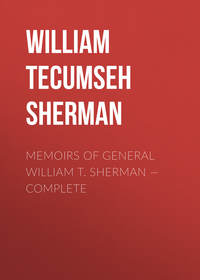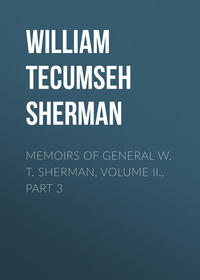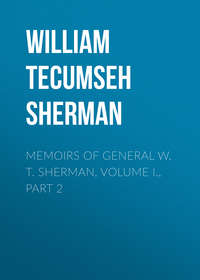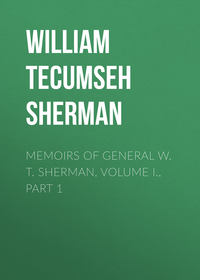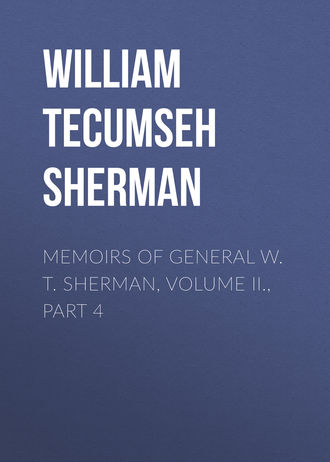 полная версия
полная версияMemoirs of General W. T. Sherman, Volume II., Part 4
If Wilmington is captured, Schofield will go there. If not, he will be sent to Newbern. In either event, all the surplus forces at the two points will move to the interior, toward Goldsboro', in cooperation with your movements. From either point, railroad communications can be run out, there being here abundance of rolling-stock suited to the gauge of those roads.
There have been about sixteen thousand men sent from Lee's army south. Of these, you will have fourteen thousand against you, if Wilmington is not held by the enemy, casualties at Fort Fisher having overtaken about two thousand.
All other troops are subject to your orders as you come in communication with them. They will be so instructed. From about Richmond I will watch Lee closely, and if he detaches many men, or attempts to evacuate, will pitch in. In the meantime, should you be brought to a halt anywhere, I can send two corps of thirty thousand effective men to your support, from the troops about Richmond.
To resume: Canby is ordered to operate to the interior from the Gulf. A. J. Smith may go from the north, but I think it doubtful. A force of twenty-eight or thirty thousand will cooperate with you from Newbern or Wilmington, or both. You can call for reenforcements.
This will be handed you by Captain Hudson, of my staff, who will return with any message you may have for me. If there is any thing I can do for you in the way of having supplies on shipboard, at any point on the seacoast, ready for you, let me know it.
Yours truly,
U. S. GRANT, Lieutenant-General.
HEADQUARTERS MILITARY DIVISION OF THE MISSISSIPPI,
IN THE FIELD, POCOTALIGO, SOUTH CAROLINA, January 29, 1885.
Lieutenant-General U. S. GRANT, City Point, Virginia.
DEAR GENERAL: Captain Hudson has this moment arrived with your letter of January 21st, which I have read with interest.
The capture of Fort Fisher has a most important bearing on my campaign, and I rejoice in it for many reasons, because of its intrinsic importance, and because it gives me another point of security on the seaboard. I hope General Terry will follow it up by the capture of Wilmington, although I do not look for it, from Admiral Porter's dispatch to me. I rejoice that Terry was not a West-Pointer, that he belonged to your army, and that he had the same troops with which Butler feared to make the attempt.
Admiral Dahlgren, whose fleet is reenforced by some more ironclads, wants to make an assault a la Fisher on Fort Moultrie, but I withhold my consent, for the reason that the capture of all Sullivan's Island is not conclusive as to Charleston; the capture of James Island would be, but all pronounce that impossible at this time. Therefore, I am moving (as hitherto designed) for the railroad west of Branchville, then will swing across to Orangeburg, which will interpose my army between Charleston and the interior. Contemporaneous with this, Foster will demonstrate up the Edisto, and afterward make a lodgment at Bull's Bay, and occupy the common road which leads from Mount Pleasant toward Georgetown. When I get to Columbia, I think I shall move straight for Goldsboro', via Fayetteville. By this circuit I cut all roads, and devastate the land; and the forces along the coast, commanded by Foster, will follow my movement, taking any thing the enemy lets go, or so occupy his attention that he cannot detach all his forces against me. I feel sure of getting Wilmington, and may be Charleston, and being at Goldsboro', with its railroads finished back to Morehead City and Wilmington, I can easily take Raleigh, when it seems that Lee must come out. If Schofield comes to Beaufort, he should be pushed out to Kinston, on the Neuse, and may be Goldsboro' (or, rather, a point on the Wilmington road, south of Goldsboro'). It is not necessary to storm Goldsboro', because it is in a distant region, of no importance in itself, and, if its garrison is forced to draw supplies from its north, it, will be eating up the same stores on which Lee depends for his command.
I have no doubt Hood will bring his army to Augusta. Canby and Thomas should penetrate Alabama as far as possible, to keep employed at least a part of Hood's army; or, what would accomplish the same thing, Thomas might reoccupy the railroad from Chattanooga forward to the Etowah, viz., Rome, Kingston, and Allatoona, thereby threatening Georgia. I know that the Georgia troops are disaffected. At Savannah I met delegates from several counties of the southwest, who manifested a decidedly hostile spirit to the Confederate cause. I nursed the feeling as far as possible, and instructed Grower to keep it up.
My left wing must now be at Sister's Ferry, crossing the Savannah River to the east bank. Slocum has orders to be at Robertsville to-morrow, prepared to move on Barnwell. Howard is here, all ready to start for the Augusta Railroad at Midway.
We find the enemy on the east aide of the Salkiehatchie, and cavalry in our front; but all give ground on our approach, and seem to be merely watching us. If we start on Tuesday, in one week we shall be near Orangeburg, having broken up the Augusta road from the Edisto westward twenty or twenty-five miles. I will be sure that every rail is twisted. Should we encounter too much opposition near Orangeburg, then I will for a time neglect that branch, and rapidly move on Columbia, and fill up the triangle formed by the Congaree and Wateree (tributaries of the Santee), breaking up that great centre of the Carolina roads. Up to that point I feel full confidence, but from there may have to manoeuvre some, and will be guided by the questions of weather and supplies.
You remember we had fine weather last February for our Meridian trip, and my memory of the weather at Charleston is, that February is usually a fine month. Before the March storms come we should be within striking distance of the coast. The months of April and May will be the best for operations from Goldsboro' to Raleigh and the Roanoke. You may rest assured that I will keep my troops well in hand, and, if I get worsted, will aim to make the enemy pay so dearly that you will have less to do. I know that this trip is necessary; it must be made sooner or later; I am on time, and in the right position for it. My army is large enough for the purpose, and I ask no reinforcement, but simply wish the utmost activity to be kept up at all other points, so that concentration against me may not be universal.
I suspect that Jeff. Davis will move heaven and earth to catch me, for success to this column is fatal to his dream of empire. Richmond is not more vital to his cause than Columbia and the heart of South Carolina.
If Thomas will not move on Selma, order him to occupy Rome, Kingston, and Allatoona, and again threaten Georgia in the direction of Athena.
I think the "poor white trash" of the South are falling out of their ranks by sickness, desertion, and every available means; but there is a large class of vindictive Southerners who will fight to the last. The squabbles in Richmond, the howls in Charleston, and the disintegration elsewhere, are all good omens for us; we must not relax one iota, but, on the contrary, pile up our efforts: I world, ere this, have been off, but we had terrific rains, which caught us in motion, and nearly drowned some of the troops in the rice-fields of the Savannah, swept away our causeway (which had been carefully corduroyed), and made the swamps hereabout mere lakes of slimy mud. The weather is now good, and I have the army on terra firma. Supplies, too, came for a long time by daily driblets instead of in bulk; this is now all remedied, and I hope to start on Tuesday.
I will issue instructions to General Foster, based on the reenforcements of North Carolina; but if Schofield comes, you had better relieve Foster, who cannot take the field, and needs an operation on his leg. Let Schofield take command, with his headquarters at Beaufort, North Carolina, and with orders to secure Goldsboro' (with its railroad communication back to Beaufort and Wilmington). If Lee lets us get that position, he is gone up.
I will start with my Atlanta army (sixty thousand), supplied as before, depending on the country for all food in excess of thirty days. I will have less cattle on the hoof, but I hear of hogs, cows, and calves, in Barnwell and the Colombia districts. Even here we have found some forage. Of course, the enemy will carry off and destroy some forage, but I will burn the houses where the people burn their forage, and they will get tired of it.
I must risk Hood, and trust to you to hold Lee or be on his heels if he comes south. I observe that the enemy has some respect for my name, for they gave up Pocotaligo without a fight when they heard that the attacking force belonged to my army. I will try and keep up that feeling, which is a real power. With respect, your friend,
W. T. SHERMAN, Major-general commanding.
P. S.–I leave my chief-quartermaster and commissary behind to follow coastwise.
W. T. S.
[Dispatch No. 6.]
FLAG-STEAMER PHILADELPHIA
SAVANNAH RIVER, January 4, 1865.
HON. GIDEON WELLS, Secretary of the Navy.
SIR: I have already apprised the Department that the army of General Sherman occupied the city of Savannah on the 21st of December.
The rebel army, hardly respectable in numbers or condition, escaped by crossing the river and taking the Union Causeway toward the railroad.
I have walked about the city several times, and can affirm that its tranquillity is undisturbed. The Union soldiers who are stationed within its limits are as orderly as if they were in New York or Boston.... One effect of the march of General Sherman through Georgia has been to satisfy the people that their credulity has been imposed upon by the lying assertions of the rebel Government, affirming the inability of the United States Government to withstand the armies of rebeldom. They have seen the old flag of the United States carried by its victorious legions through their State, almost unopposed, and placed in their principal city without a blow.
Since the occupation of the city General Sherman has been occupied in making arrangements for its security after he leaves it for the march that he meditates. My attention has been directed to such measures of cooperation as the number and quality of my force permit.
On the 2d I arrived here from Charleston, whither, as I stated in my dispatch of the 29th of December, I had gone in consequence of information from the senior officer there that the rebels contemplated issuing from the harbor, and his request for my presence. Having placed a force there of seven monitors, sufficient to meet each an emergency, and not perceiving any sign of the expected raid, I returned to Savannah, to keep in communication with General Sherman and be ready to render any assistance that might be desired. General Sherman has fully informed me of his plans, and, so far as my means permit, they shall not lack assistance by water.
On the 3d the transfer of the right wing to Beaufort was began, and the only suitable vessel I had at hand (the Harvest Moon) was sent to Thunderbolt to receive the first embarkation. This took place about 3 p.m., and was witnessed by General Sherman and General Bernard (United States Engineers) and myself. The Pontiac is ordered around to assist, and the army transports also followed the first move by the Harvest Moon.
I could not help remarking the unbroken silence that prevailed in the large array of troops; not a voice was to be heard, as they gathered in masses on the bluff to look at the vessels. The notes of a solitary bugle alone came from their midst.
General Barnard made a brief visit to one of the rebel works (Cansten's Bluff) that dominated this water-course–the best approach of the kind to Savannah.
I am collecting data that will fully exhibit to the Department the powerful character of the defenses of the city and its approaches. General Sherman will not retain the extended limits they embrace. but will contract the line very much.
General Foster still holds the position near the Tullifinny. With his concurrence I have detached the fleet brigade, and the men belonging to it have returned to their vessels. The excellent service performed by this detachment has fully realized my wishes, and exemplified the efficiency of the organization–infantry and light artillery handled as skirmishers. The howitzers were always landed as quickly as the men, and were brought into action before the light pieces of the land-service could be got ashore.
I regret very much that the reduced complements of the vessels prevent me from maintaining the force in constant organization. With three hundred more marines and five hundred seamen I could frequently operate to great advantage, at the present time, when the attention of the rebels is so engrossed by General Sherman.
It is said that they have a force at Hardeeville, the pickets of which were retained on the Union Causeway until a few days since, when some of our troops crossed the river and pushed them back. Concurrently with this, I caused the Sonoma to anchor so as to sweep the ground in the direction of the causeway.
The transfer of the right-wing (thirty thousand men) to Beaufort will so imperil the rebel force at Hardeeville that it will be cut off or dispersed, if not moved in season.
Meanwhile I will send the Dai-Ching to St. Helena, to meet any want that may arise in that quarter, while the Mingo and Pontiac will be ready to act from Broad River.
The general route of the army will be northward; but the exact direction must be decided more or less by circumstances which it may not be possible to foresee....
My cooperation will be confined to assistance in attacking Charleston, or in establishing communication at Georgetown, in case the army pushes on without attacking Charleston, and time alone will show which of these will eventuate.
The weather of the winter first, and the condition of the ground in spring, would permit little advantage to be derived from the presence of the army at Richmond until the middle of May. So that General Sherman has no reason to move in haste, but can choose such objects as he prefers, and take as much time as their attainment may demand. The Department will learn the objects in view of General Sherman more precisely from a letter addressed by him to General Halleck, which he read to me a few days since.
I have the honor to be, very respectfully, your obedient servant,
J. A. DAHLGREN,
Rear-Admiral, commanding South-Atlantic Blockading-Squadron.
HEADQUARTERS MILITARY DIVISION OF THE MISSISSIPPI,
IN THE FIELD, POCOTALIGO, SOUTH CAROLINA, January 29, 1885.
Major-General J. G. FOSTER, commanding Department of the South.
GENERAL: I have just received dispatches from General Grant, stating that Schofield's corps (the Twenty-third), twenty-one thousand strong, is ordered east from Tennessee, and will be sent to Beaufort, North Carolina. That is well; I want that force to secure a point on the railroad about Goldsboro', and then to build the railroad out to that point. If Goldsboro' be too strong to carry by a rapid movement, then a point near the Neuse, south of Goldsboro', will answer, but the bridge and position about Kinston, should be held and fortified strong. The movement should be masked by the troops already at Newbern. Please notify General Palmer that these troops are coming, and to be prepared to receive them. Major-General Schofield will command in person, and is admirably adapted for the work. If it is possible, I want him to secure Goldsboro', with the railroad back to Morehead City and Wilmington. As soon as General Schofield reaches Fort Macon, have him to meet some one of your staff, to explain in full the details of the situation of affairs with me; and you can give him the chief command of all troops at Cape Fear and in North Carolina. If he finds the enemy has all turned south against me, he need not follow, but turn his attention against Raleigh; if he can secure Goldsboro' and Wilmington, it will be as much as I expect before I have passed the Santee. Send him all detachments of men that have come to join my army. They can be so organized and officered as to be efficient, for they are nearly all old soldiers who have been detached or on furlough. Until I pass the Santee, you can better use these detachments at Bull's Bay, Georgetown, etc.
I will instruct General McCallum, of the Railroad Department, to take his men up to Beaufort, North Carolina, and employ them on the road out. I do not know that he can use them on any road here. I did instruct him, while awaiting information from North Carolina, to have them build a good trestle-bridge across Port Royal ferry; but I now suppose the pontoon-bridge will do. If you move the pontoons, be sure to make a good road out to Garden's Corners, and mark it with sign-boards–obstructing the old road, so that, should I send back any detachments, they would not be misled.
I prefer that Hatch's force should not be materially weakened until I am near Columbia, when you may be governed by the situation of affairs about Charleston. If you can break the railroad between this and Charleston, then this force could be reduced.
I am, with respect, etc.,
W. T. SHERMAN, Major-General commanding.
HEADQUARTERS MILITARY DIVISION OF THE MISSISSIPPI,
IN THE FIELD, POCOTALIGO, SOUTH CAROLINA, January 18, 1865.
Hon. EDWIN M. STANTON, Secretary of War, Washington, D. C.
SIR: When you left Savannah a few days ago, you forgot the map which General Geary had prepared for you, showing the route by which his division entered the city of Savannah, being the first troops to occupy that city. I now send it to you.
I avail myself of the opportunity also to inclose you copies of all my official orders touching trade and intercourse with the people of Georgia, as well as for the establishment of the negro settlements.
Delegations of the people of Georgia continue to come in, and I am satisfied that, by judicious handling and by a little respect shown to their prejudices, we can create a schism in Jeff. Davis's dominions. All that I have conversed with realize the truth that slavery as an institution is defunct, and the only questions that remain are what disposition shall be made of the negroes themselves. I confess myself unable to offer a complete solution for these questions, and prefer to leave it to the slower operations of time. We have given the initiative, and can afford to await the working of the experiment.
As to trade-matters, I also think it is to our interest to keep the Southern people somewhat dependent on the articles of commerce to which they have hitherto been accustomed. General Grover is now here, and will, I think, be able to handle this matter judiciously, and may gradually relax, and invite cotton to come in in large quantities. But at first we should manifest no undue anxiety on that score; for the rebels would at once make use of it as a power against us. We should assume, a tone of perfect contempt for cotton and every thing else in comparison with the great object of the war–the restoration of the Union, with all its rights and power. It the rebels burn cotton as a war measure, they simply play into our hands by taking away the only product of value they have to exchange in foreign ports for war-ships and munitions. By such a course, also, they alienate the feelings of a large class of small farmers who look to their little parcels of cotton to exchange for food and clothing for their families. I hope the Government will not manifest too much anxiety to obtain cotton in large quantities, and especially that the President will not indorse the contracts for the purchase of large quantities of cotton. Several contracts, involving from six to ten thousand bales, indorsed by Mr. Lincoln, have been shown me, but were not in such a form as to amount to an order to compel me to facilitate their execution.
As to Treasury agents, and agents to take charge of confiscated and abandoned property, whose salaries depend on their fees, I can only say that, as a general rule, they are mischievous and disturbing elements to a military government, and it is almost impossible for us to study the law and regulations so as to understand fully their powers and duties. I rather think the Quartermaster's Department of the army could better fulfill all their duties and accomplish all that is aimed at by the law. Yet on this subject I will leave Generals Foster and Grover to do the best they can.
I am, with great respect, your obedient servant,
W. T. SHERMAN, Major-General commanding.
HEADQUARTERS MILITARY DIVISION OF THE MISSISSIPPI,
IN THE FIELD, POCOTALIGO, SOUTH CAROLINA, January 2, 1865.
Hon. EDWIN M. STANTON, Secretary of War, Washington, D. C.
SIR: I have just received from Lieutenant-General Grant a copy of that part of your telegram to him of December 26th relating to cotton, a copy of which has been immediately furnished to General Easton, chief-quartermaster, who will be strictly governed by it.
I had already been approached by all the consuls and half the people of Savannah on this cotton question, and my invariable answer was that all the cotton in Savannah was prize of war, belonged to the United States, and nobody should recover a bale of it with my consent; that, as cotton had been one of the chief causes of this war, it should help to pay its expenses; that all cotton became tainted with treason from the hour the first act of hostility was committed against the United States some time in December, 1860; and that no bill of sale subsequent to that date could convey title.
My orders were that an officer of the Quartermaster's Department, United States Army, might furnish the holder, agent, or attorney, a mere certificate of the fact of seizure, with description of the bales' marks, etc., the cotton then to be turned over to the agent of the Treasury Department, to be shipped to New York for sale. But, since the receipt of your dispatch, I have ordered General Easton to make the shipment himself to the quartermaster at New York, where you can dispose of it at pleasure. I do not think the Treasury Department ought to bother itself with the prizes or captures of war.
Mr. Barclay, former consul at New York, representing Mr. Molyneux, former consul here, but absent a long time, called on me with reference to cotton claimed by English subjects. He seemed amazed when I told him I should pay no respect to consular certificates, that in no event would I treat an English subject with more favor than one of our own deluded citizens, and that for my part I was unwilling to fight for cotton for the benefit of Englishmen openly engaged in smuggling arms and instruments of war to kill us; that, on the contrary, it would afford me great satisfaction to conduct my army to Nassau, and wipe out that nest of pirates. I explained to him, however, that I was not a diplomatic agent of the General Government of the United States, but that my opinion, so frankly expressed, was that of a soldier, which it would be well for him to heed. It appeared, also, that he owned a plantation on the line of investment of Savannah, which, of course, was pillaged, and for which he expected me to give some certificate entitling him to indemnification, which I declined emphatically.
I have adopted in Savannah rules concerning property–severe but just–founded upon the laws of nations and the practice of civilized governments, and am clearly of opinion that we should claim all the belligerent rights over conquered countries, that the people may realize the truth that war is no child's play.
I embrace in this a copy of a letter, dated December 31, 1864, in answer to one from Solomon Cohen (a rich lawyer) to General Blair, his personal friend, as follows:
Major-General F. P. BLAIR, commanding Seventeenth Army Corps.
GENERAL: Your note, inclosing Mr. Cohen's of this date, is received, and I answer frankly through you his inquiries.
1. No one can practise law as an attorney in the United States without acknowledging the supremacy of our Government. If I am not in error, an attorney is as much an officer of the court as the clerk, and it would be a novel thing in a government to have a court to administer law which denied the supremacy of the government itself.
2. No one will be allowed the privileges of a merchant, or, rather, to trade is a privilege which no one should seek of the Government without in like manner acknowledging its supremacy.


